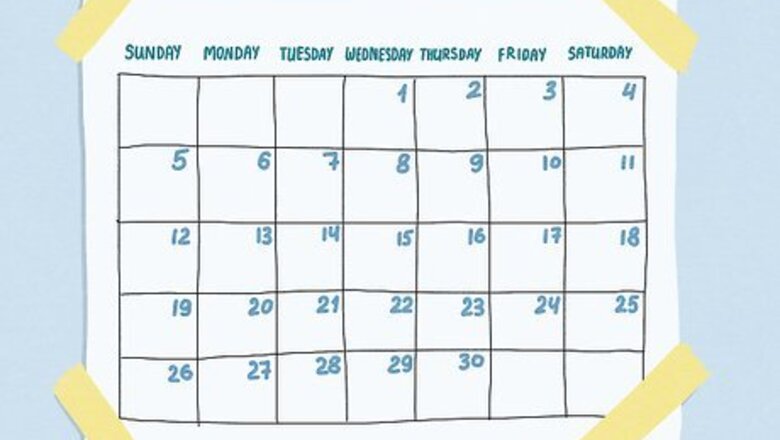
views
Using Calendar Time
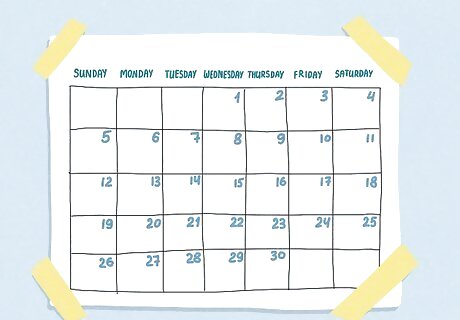
Buy or make a large calendar and place it at your child’s eye level. You can purchase a large calendar at a teacher supply store or make one to use with your child. Draw a grid with 31 spaces on it and number the spaces according to the days for the month you are in. Then, label each column on the calendar with the day of the week. Write the name of the month at the top of the calendar as well. If your child is older, you could even allow them to make the calendar. Help them label the spaces correctly using another calendar as a model. Try placing the calendar somewhere that your child will see it many times during the day, such as on the refrigerator or in your family room. You could also put a customizable pocket chart in the front of your classroom. Each day, you and your students can change the day of the week.
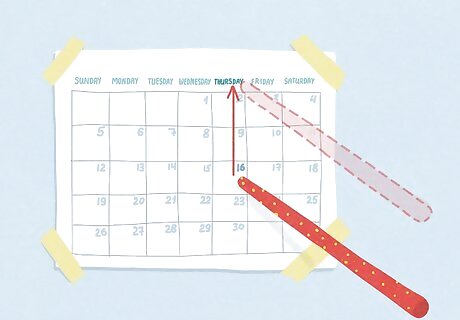
Create a pointing stick or wand to help make the activity more fun. Purchase a wooden dowel and wrap it in decorative paper or paint it to make it pretty. Use the pointing stick to point to specific dates on the calendar when you have calendar time. For example, you can point to the date and then use the pointing stick to trace upwards to where the day of the week is written. Once your child has seen you use the pointing stick a few times, you can let them use it to point out the days of the week.

Devote 5 to 10 minutes to calendar time every day. Try doing calendar time right after breakfast or while your child is having their morning snack. Whenever you decide to do it, make calendar time part of your daily routine to help your child learn the concepts of the days of the week and time. Repetition is important for teaching your child new concepts. Having a routine will also be comforting to your child and help them know what to expect each day.
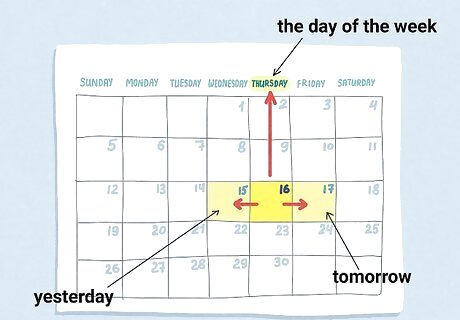
Point out today, yesterday, and tomorrow in each calendar session. Use your finger or the pointing stick to identify what day today is on the calendar. Then, trace upwards to the top of the column to identify the day of the week. Say what day of the week it is out loud. Then, point to the days that will be tomorrow and yesterday. Once your child gets used to the routine and starts to learn how to identify the days themselves, you could hand your child the pointer and ask them to show you what day it is. Ask them questions to prompt them to identify other days, such as by saying, “What day will tomorrow be?” or “What day of the week is the 10th?”
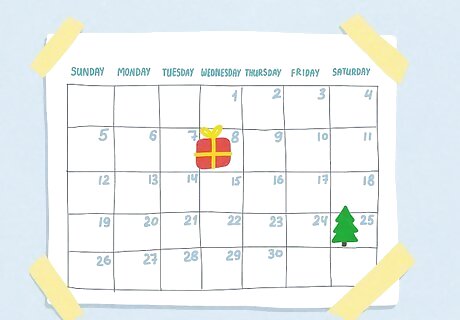
Ask your child questions about important dates on the calendar. Direct your kid's attention to holidays and other special days on the calendar, by using pictures and stickers. Then, point out what day of the week these special days fall on. For example, you could say, “Look! Your birthday is on a Wednesday, which is the middle of the week!” or “Halloween is on a Saturday, so we can celebrate all day long!”Tip: Try printing out small pictures that your child can color and place on the calendar to indicate special days, such as a birthday cake for someone’s birthday or a present for Christmas.
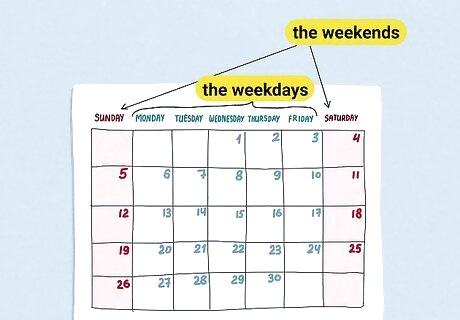
Explain the difference between weekdays and weekends. Color code the weekdays and weekend days on your calendar to help your child see the difference. Tell your child that Monday, Tuesday, Wednesday, Thursday, and Friday are the days when kids go to school and many people work on these days as well. However, also explain that some people work the weekends depending on the type of job they have. Explaining the difference between the weekdays and weekend days and may help your child to identify the days of the week.
Singing Songs about the Days of the Week
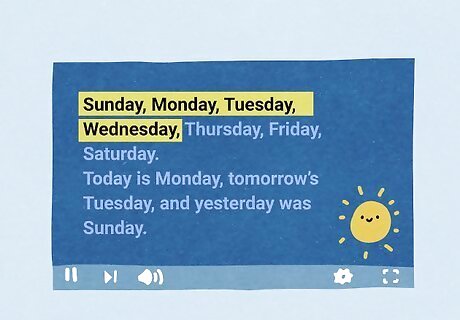
Play songs about the days of the week for your child. A song can help your child to learn and remember the days in an enjoyable way. There are lots of different versions of the days of the week song, so listen to a few and choose one that you think will hold your child’s interest. Then, show them a video of the song to introduce them to it.Tip: If you’d rather not show your child a video of the song, you could also use the audio-only to introduce them to it and help them learn the lyrics.
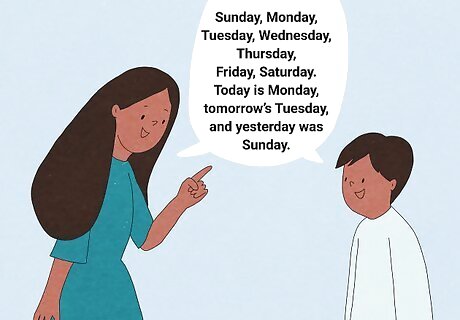
Sing the song with your child daily to help them learn it. If you incorporate calendar time into your daily routine, try singing the days of the week song after you finish calendar time. Teach your child a simple version of the song and pair it with a well-known tune. For example, you could teach your child to sing, “Sunday, Monday, Tuesday, Wednesday, Thursday, Friday, Saturday. Today is Monday, tomorrow’s Tuesday, and yesterday was Sunday.” You can pair the lyrics with any simple tune that your child knows well, such as “Clementine,” “Twinkle Twinkle Little Star,” or “Old MacDonald.”
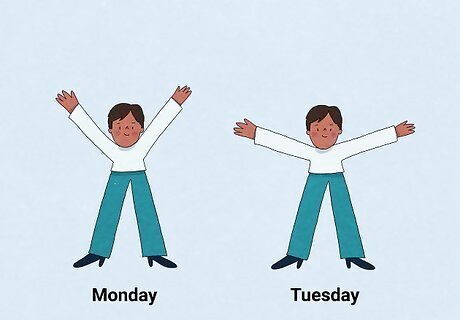
Show your child hand gestures to go along with the song. Try starting the days of the week song with your hands straight up in the air, then bring them out to the 11:00 and 1:00 positions when you say Monday, then 10:00 and 2:00 for Tuesday, and so on until they are down at your sides. Hand gestures are optional, but they may help to reinforce the different days of the week and help your child remember them. Another simple way to incorporate hand gestures is to clap or snap your fingers each time you say a day of the week. You could also teach your students the days of the week with special dance moves.
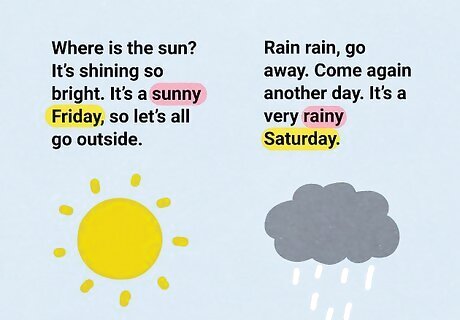
Include a song about the weather for extra reinforcement. If you want to pair the days with another concept, you could also try singing a song about the weather. This will help your child to learn the days of the week while also helping them to learn about different types of weather. For example, if the weather is nice, you could sing, “Where is the sun? It’s shining so bright. It’s a sunny Friday, so let’s all go outside.” Or, on a rainy day, you could sing, “Rain rain, go away. Come again another day. It’s a very rainy Saturday.”
Trying Other Strategies
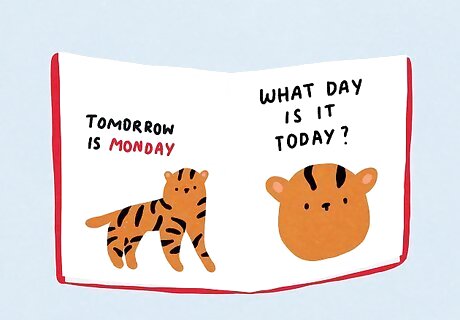
Read books that explain the days of the week. Try to find picture books that deal with the topic of the days of the week and read them to your child. have him/her read the book to you, or even try to explain the pictures and events. This may help to reinforce the concepts of the days of the week or serve as a good way to introduce them, but it only works if they can read Some good examples of days of the week books include: The Very Hungry Caterpillar by Eric Carle Today is Monday by Eric Carle Cookie’s Week by Cindy Ward Monday is One Day by Arthur A. Levine
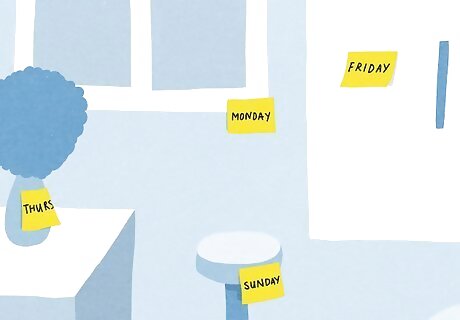
Post signs for the days of the week around a room. Write the days of the week on signs and tape them up around a large room in your house or in a few different rooms. Then, shout out the days of the week one at a time and have your child run to the corresponding sign as you shout out the days. Do this once per day to help reinforce the days and give your child some exercise. This is a great rainy day game for children who can read. Tip: You could also take this activity outdoors if you don’t want your child running in the house. Try placing the signs for different days of the week at different spots around your back yard or at a local playground, and then shout out the days of the week that you want your child to run to.
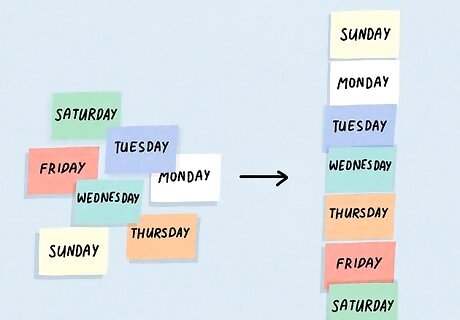
Write the days on cards and ask your child to put them in order. Turn the days of the week into a memory or pattern organization activity by writing the days of the week on individual cards and shuffling them. Then, ask your child to put them in order by laying them out on a table or desk. This is a good way to help a child who is learning to read recognize the days of the week.
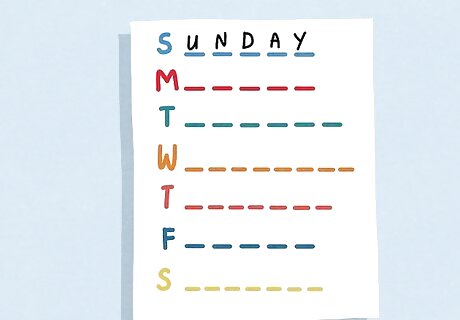
Give your child days of the week worksheets for more practice. If your child is writing or is allowed to use scissors and glue, you could provide them with an age-appropriate worksheet. Explain to your child how to complete the worksheet. Some involve writing the days of the week in provided spaces while others require cutting out the days of the week and pasting them into spaces. There are lots of free worksheets available online. Choose one or more than your child might enjoy and print them out.

Mention days of the week in conversations with your child. Repetition will also help to reinforce the days of the week. Try to work what day it is into your conversations and talk about other days of the week in conversations with your child. For example, you could say something like, “Today is Thursday, so we will go to the grocery store and get our groceries for the week.” Or you could say, “Tomorrow is Friday, so we will have pizza for dinner! We have pizza for dinner every Friday.”




















Comments
0 comment